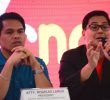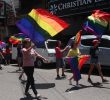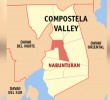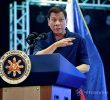Yesterday, a group of three young Lumad mothers and four very young children including a one-year-old baby came to the house to ask for pinaskohan (Christmas presents). No sooner had they announced their purpose in coming than I ushered them into the courtyard of my house and bade them settle on the benches and table that used to be utility components of our defunct bakeshop.
I warmly welcomed them in my little realm, engaged them in friendly chat to make them feel as relaxed and comfortable as my speech and body language could hospitably show. Soon I asked for their ethnic identity. The eldest among them proclaimed almost cheerily they were Matigsalug. There are more than a hundred of their tribal kinsfolk now housed in the Toril gym.
Earlier the good mayor of Davao City had issued his injunctions to receive kindly these gentle people from the mountain areas of Davao. He said it is their constitutional right as Filipino citizens to go wherever they want. But he added that our respect and solicitude for them do not stop there. “As Christians” the City Dad said, “we should show them the Christian message of Christmas.”
Well, I hastened to collect from our bedroom closets some used and unused clothes—children’s t-shirts and dresses, men’s pants and ladies’ sweaters and overcoats—and packed them in plastic bags and handed them as graciously as I could to my first Lumad visitors this early part of the so-called Christmas season.
One of the mothers asked if I could part some rice saying the government’s food aid had not yet been delivered and they had nothing to cook for the day’s meals. I bought 3 kilos of rice from the village coop store and gladly tucked the goods into a sack they had been carrying. I also parted the coins I got as sukli of the cash I paid for the rice. And to the kids I gave comic books which have been long stocked in my room for at least two Christmases, because I had no candies nor toys in the house.
After some moments of pleasantries I walked with them a little distance from my house to the street corner as they left. Gazing at them walking away, they left behind in my mind an unsettling query and in my heart a feeling of dismay almost akin to anger.
Alone in my room I recalled what my close friend, an anthropologist who, confronted with the seemingly neutral and apolitical term lumad (native) asked, “We call these people lumad or native. But if we call them native—native to these islands we call our native land—then we, in juxtaposition to them, are therefore not native to this Land! So, what are we natives of?”
To this day this remarkable discourse in the form of an incisive inquiry constantly pricks my conscience and generates a revolting kind of thought and feeling that points to the beginnings of a system of injustice and great great wrong ever to thrive in human society. It angers me, makes me grit my teeth, inflame my eyes. One question begets another and another and another. Not really essentially as questions, but as answers.
Truly, we the so-called Christian population, as non-native (non-lumad) of these chain of islands called the Philippines, have no birthright to this Land. We are strangers here. We are aliens. They the Lumads are the real owners of this Land. Having no birthright , we have no right to drive them away from their original abode. We have no right to dispossess them of their lands. We have no right to drive them away to the hinterlands. We have no right to deprive them of the fruits of the land bestowed upon them by Nature since the beginning of Time.
How dare we Christians arrogate to ourselves the ownership and dominion of the entire archipelago that rightfully belong to the Lumads, the Katutubo, the Indigenous People. What utter shame that we grab and rob them of their sacred domain that their ancestors have handed down to them from ancient times. We don’t belong here. And these lands don’t belong to us . We are strangers here . At worst, we are the colonizers of these people. By the edicts of our own arrogance and greed and evil ways, we demean, marginalize, discriminate, exploit, oppress, dehumanize these original people of this earth of humankind.. We have stripped them of their very dignity and humanity.
We Christians who call ourselves children of God or followers of Christ, ours is the most abominable of all sins—we have denied the Lumads their inherent humanity. We claim the privilege of being the chosen people of God? Our philosophy derives sustenance from the bestial greed for power and wealth. The breath of our priests and secular rulers reeks of uttermost hypocrisy! We are evil!
Seeing the humble honest countenance of my Matigsalug visitors, reflecting on the rest of the tribal peoples that constitute the Lumad peoples on these lands—their miserable plight—all the horrible injustices they have endured through the centuries—I seem to feel a kind of helplessness weighing over me—that all the ideals underlying my advocacies and efforts for a humane and just Philippine society would ever come to reality.
I behold with great dismay the luxury enjoyed by the privileged citizens of this country—they who bathe in milk, lavish on the choicest victuals and most sumptuous board the precious fruits of the earth have bestowed—they are not supposed to tramp on the backs of the Lumads and the other toiling masses of the original residents of these lands. Noynoy Aquino and the rest of the wealthy scions of landgrabbers and thieves who have come from foreign lands are not supposed to enjoy the treasures and riches of the country.
Nevertheless, the visit of the three Matigsalug mothers and their children was a gladsome event for me, a happy blessing –a rare pinaskohan of a sort that clings to the original message of the very first Christmas—that it is in giving that we receive. Yet, deep in my heart, the only real gift ever to be handed over to the Lumads and to all the impoverished masses of the Filipino people is Justice and Freedom and Peace. And these are gifts delivered not on a silver platter, but through unrelenting arduous struggle.










